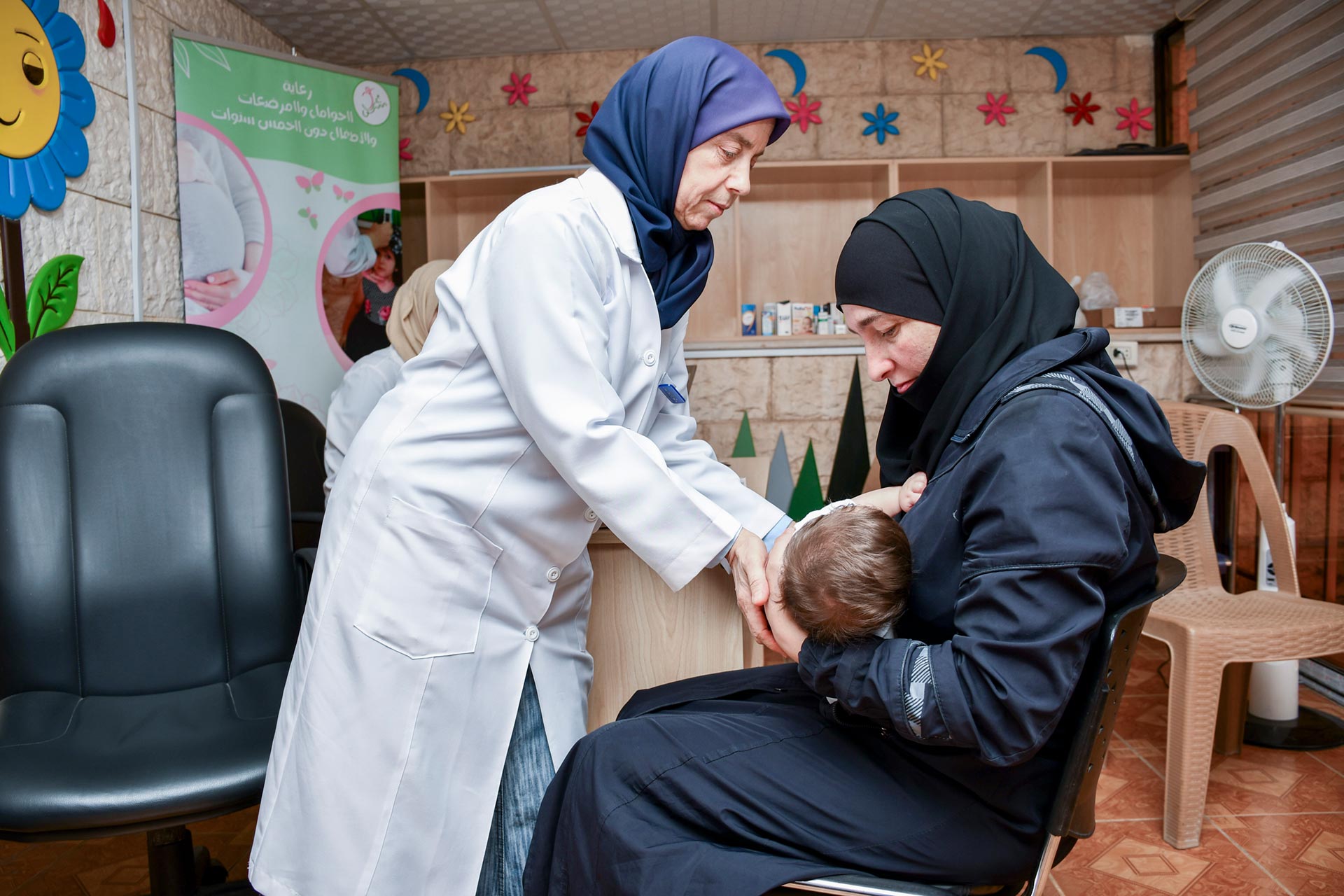Breastfeeding: is an investment in Syria’s future
 Damascus, 3 August 2025 – As the world marks World Breastfeeding Week, Syria faces a sobering reality: far too many children are missing out on the life-saving benefits of breastfeeding. Only 4 in 10 infants in Syria are exclusively breastfed during their first six months - a critical window for survival, growth, and brain development. Just 35 per cent continue breastfeeding until the recommended age of two.
Damascus, 3 August 2025 – As the world marks World Breastfeeding Week, Syria faces a sobering reality: far too many children are missing out on the life-saving benefits of breastfeeding. Only 4 in 10 infants in Syria are exclusively breastfed during their first six months - a critical window for survival, growth, and brain development. Just 35 per cent continue breastfeeding until the recommended age of two.
This year’s World Breastfeeding Week – “Invest in Breastfeeding, Invest in the Future,” is a stark reminder of the critical role breastfeeding plays in protecting child health and development. As families across Syria face prolonged crisis, displacement, and economic hardship, breastfeeding provides a vital line of defence—boosting children’s immunity, supporting brain development, and protecting against malnutrition.
“The Ministry of Health is fully committed to strengthening national breastfeeding support systems—from health counselling to workplace protections,” said H.E. Dr. Musaab Alali, Minister of Health of the Syrian Arab Republic. “Investing in breastfeeding is a cost-effective way to protect the health of both mothers and children and build a healthier future for Syria.”
Malnutrition remains a serious concern in Syria. Nearly 1 in 4 children under five years of age are short for their age due to chronic undernutrition, and 5.8 per cent suffer from undernutrition (wasting), placing them at immediate risk of death without treatment. Breastfeeding can help prevent both conditions, ensuring children not only survive, but thrive.
“Breastfeeding saves lives. It is a child’s first vaccine—providing essential nutrients, antibodies and protection in the earliest and most vulnerable stage of life,” said Ms. Christina Bethke, WHO Acting Representative in Syria. “It is also a safeguard for mothers’ health. WHO is working with the Ministry of Health, UNICEF, and partners to strengthen the health system, train health workers, and raise awareness to ensure that every woman in Syria has the support and space to breastfeed safely.”
Yet too many mothers lack time, support, information, or a safe environment to breastfeed. Creating enabling conditions—at home, in workplaces, communities, and health facilities—is essential.
UNICEF and WHO jointly call for stronger, more sustainable breastfeeding support systems, including:
Urgent enactment of the revised Code of Marketing of Breastmilk Substitutes;
Paid maternity leave and breastfeeding-friendly workplaces;
Protection from aggressive marketing of breastmilk substitutes;
Access to skilled breastfeeding counsellors and support in health facilities;
Greater peer and community support for mothers.
“UNICEF remains committed to supporting the Ministry of Health to advance systems and create and enabling environment in support of breastfeeding mothers,” said Ms. Zeinab Adam, Deputy Representative, UNICEF in Syria. “When a mother is supported to breastfeed, an entire generation is given a better chance at life. This is not only an investment in a child’s future—but in Syria’s future.”
Breastfeeding is not just a personal choice—it is a public health priority and a shared responsibility. When mothers are supported at every level, they are far more likely to start and continue breastfeeding, giving their children the healthiest start in life.
For further information, please contact:
UNICEF:
Monique Awad, Chief Communication and Advocacy, email:
This e-mail address is being protected from spambots. You need JavaScript enabled to view it
Hasan Burhan, Communication Officer, email:
This e-mail address is being protected from spambots. You need JavaScript enabled to view it
WHO:
Mrinalini Santhanam, Communications Officer, email: This e-mail address is being protected from spambots. You need JavaScript enabled to view it
Halah Kabash, Communication Officer, email: This e-mail address is being protected from spambots. You need JavaScript enabled to view it
About UNICEF
UNICEF, the United Nations Children’s Fund, works to protect the rights of every child, everywhere, especially the most disadvantaged children and in the toughest places to reach. Across more than 190 countries and territories, we do whatever it takes to help children survive, thrive, and fulfil their potential.
Follow UNICEF Syria on Linked-In, Facebook, X, Instagram, YouTube, and visit UNICEF Syria's website.
About WHO
WHO leads global efforts to expand universal health coverage. We direct and coordinate the world’s response to health emergencies. And we promote healthier lives – from pregnancy care through old age. Our Triple Billion targets outline an ambitious plan for the world to achieve good health for all using science-based policies and programmes.
Follow WHO Syria on: Facebook, X, Instagram, YouTube, and visit WHO Syria's website.




